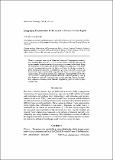Long-Term Perseveration in Alzheimer’s Disease: A Case Report
Author(s)
Sullivan, Edith V.
Download3037.1991.376052.pdf (1.150Mb)
PUBLISHER_CC
Publisher with Creative Commons License
Creative Commons Attribution
Terms of use
Metadata
Show full item recordAbstract
The most common clinical sign of Alzheimer's disease (AD) is progressive memory loss. Presented here is a case of AD who, despite ultimate profound dementia with severe amnesia, showed retention of a perseverative response she developed during 26 encounters, over 4.5 years, with the Brown–Peterson distractor test. From Test 9 onwards, she responded from the first distractor-filled trial with one consonant trigram, appearing in none of the seven test forms given her. At Test 26, she could not repeat heard trigrams yet faithfully responded with her perseverative trigram. The trigram, ostensibly declarative information, apparently became part and parcel of the task's procedure. Although perseveration is a form of impairment probably resulting from Alzheimer pathology involving frontal and parietal cortex, it may also reflect a form of preserved memory, albeit distorted, supported by posterior cortical regions spared in AD.
Date issued
1991Department
Massachusetts Institute of Technology. Department of Brain and Cognitive SciencesJournal
Behavioural Neurology
Publisher
IOS Press
Citation
Sullivan, Edith V. “Long-Term Perseveration in Alzheimer’s Disease: A Case Report,” Behavioural Neurology, vol. 4, no. 4, pp. 225-233, 1991. © 1991 Rapid Communications of Oxford Ltd
Version: Final published version
ISSN
0953-4180
1875-8584